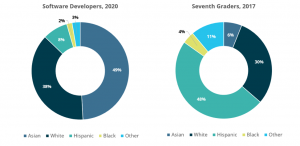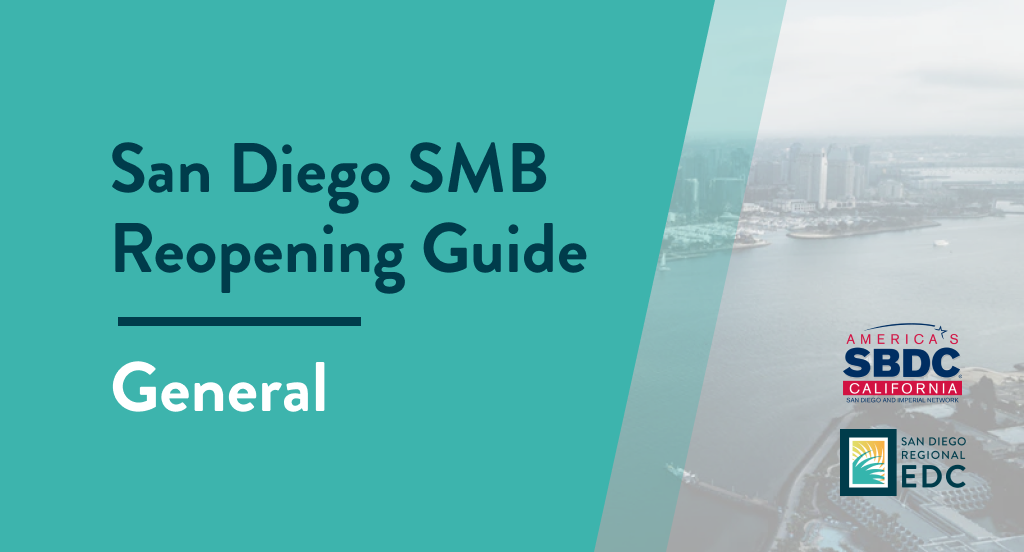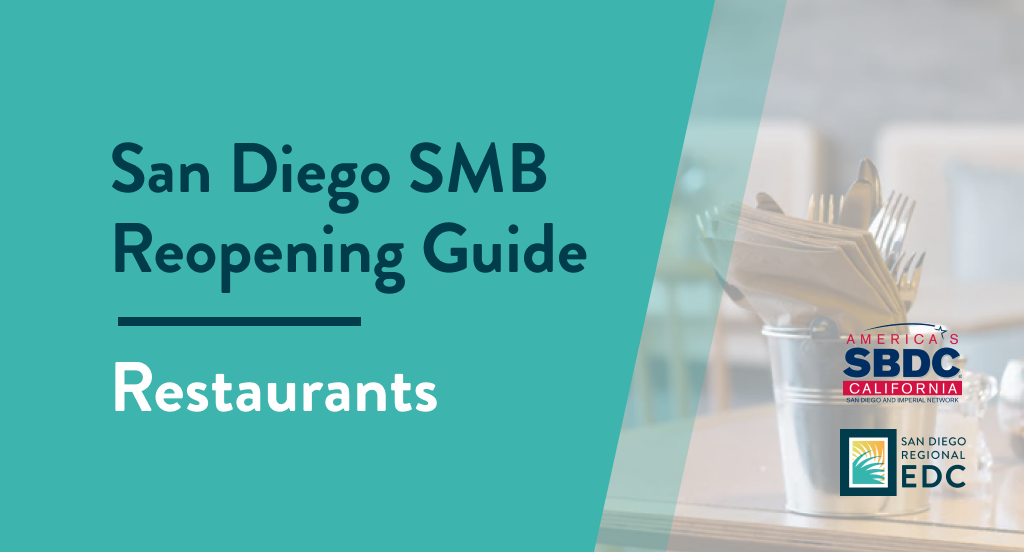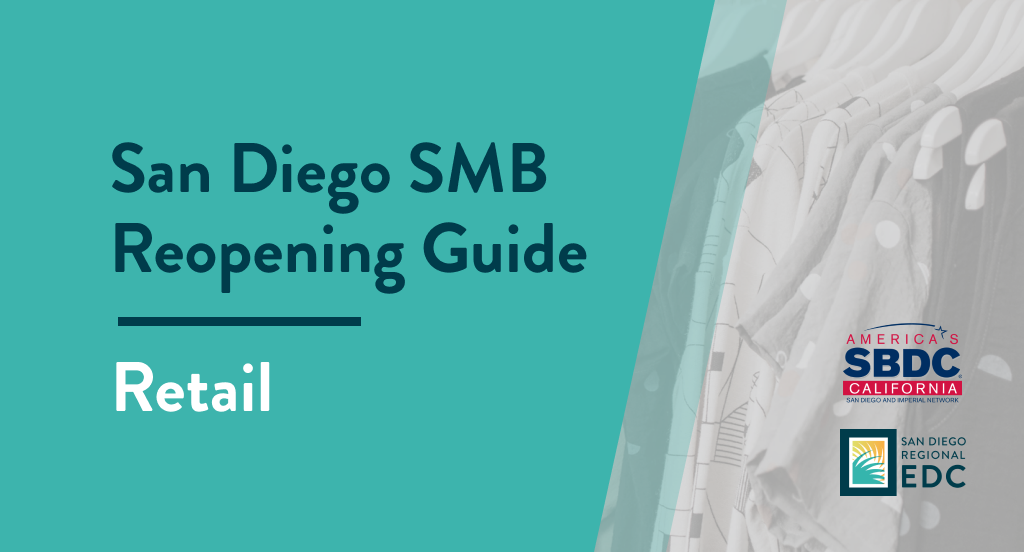I hope this message continues to find you and your families healthy and safe. Our team at EDC continues to work from home and we are focusing all of our time and energy on helping local small businesses get connected to the resources and services they need during these confusing and challenging times.
Over the last several weeks, I had the opportunity to serve on the RECOVER economic recovery advisory group formed by County Supervisor Greg Cox and San Diego Mayor Kevin Faulconer. The group was brought together to form a regional plan for reopening businesses and setting up appropriate communication channels with the business community. The group was comprised of several chambers of commerce, business and trade associations, economic development organizations, and education and labor groups. The hope going forward is that our collective reach will continue to provide our local government officials with quick and accurate feedback from a broad section of our business community as we navigate the various stages of economic recovery. The guidelines that the group developed are posted here and can also be found on the City and County’s websites.
In a closing memo that I wrote to Mayor Faulconer and Supervisor Cox, I urged the City and the County—and all advisory group members—to continue to host and maintain similar discussions for regional businesses focused on childcare and the reopening of schools.
Clearly, a large segment of our workforce will not be able to return to employment with any level of normalcy while their children are still home with no prospect of school, summer school/camps, and childcare. Our partners at the San Diego Regional Chamber of Commerce and San Diego Workforce Partnership have already been focused heavily on childcare over the last few years. They are continuing the difficult job of working with childcare providers and businesses to ensure that we are not having these conversations or planning in vacuums.
Our team at EDC and more than 30 community partners have spent the last two years trying to create inclusive economic development strategies to ensure that more of our community members can thrive within our local economy. One of our three pillars has been addressing the growing educational achievement gap. We have been working to ensure that businesses are more engaged with this issue. Now more than ever, we feel that getting business and education leaders together to think through how we effectively reopen our schools and support each other through the difficult months ahead is one of the most critical issues we face. Our team at EDC will do everything we possibly can to continue to facilitate these discussions, push for solutions and set up communication systems to help maintain ongoing progress and success to ensure that we phase back into work-based and school-based activities in a coordinated fashion.
And finally, the impacts of this horrific healthcare and economic crisis have not hit our community (or our nation) evenly. African American, Asian, and Latino communities have been disproportionately impacted by the virus, and they have also been disproportionately impacted by the layoffs, business closures, school closures, and economic challenges our advisory group focused on. The locally-owned hospitality, retail, and restaurants have clearly been hit the hardest. Small and minority-owned businesses are in the most need of financial support and will continue to need our attention, our resources, and our services as we work our way through recovery. I urged the Mayor, City Council, and County Board of Supervisors—regardless of political party affiliation and the various segments of our community that they represent—to be visibly united in ensuring that our economic recovery remains focused on the individuals, businesses, communities, and sectors of our economy that have been hardest hit.
I closed my memo by indicating that San Diego Regional EDC remains fully committed to ensuring that all of our resources, energy, and programs are focused on the unique challenges and opportunities of the economic recovery that lie ahead of us. I want to restate that commitment to all of you as well. We have to get this right.
A Record-Setting Jobs Report
Incoming data confirmed what most of us already knew: The U.S. economy lost a record number of jobs in April. The Bureau of Labor Statistics (BLS) reported that the economy shed 20.5 million payroll jobs, lifting the unemployment rate to 14.7%, a rate unseen since the Great Depression. Job losses were spread across every industry, but cuts were especially severe in leisure & hospitality, which gave up some 7.7 million positions.
The BLS data are roughly consistent with payroll processor ADP’s employment report that shows 20.2 million job losses at private companies last month. Similar to the BLS, ADP reported that cuts were heavily concentrated in leisure & hospitality. ADP also measured employment changes across different firm sizes, and showed that companies employing fewer than 50 workers let go of 6 million workers in April.
What The U.S. Numbers Could Mean Locally
The crater in small business employment across the U.S. last month could portend an especially bad jobs report locally. Businesses with fewer than 50 workers employ 45% of San Diegans, compared with just 29% nationally. Job losses on the scale of the national figure would imply roughly 120,000 fewer payrolls at San Diego small businesses in April alone, roughly the same number of jobs lost across businesses of all sizes between December 2007 and January 2010 during the last recession.
Cutting the data across industries is equally disarming. Accommodation & food service companies employ about one in every 10 local workers. Both the BLS and ADP reports show that hospitality businesses essentially halved their staffs last month; a similar contraction in San Diego would translate to about 85,000 to 90,000 lost jobs. However, San Diego hospitality employment has historically been more sensitive to downturns than nationally, meaning as many as 120,000, or nearly two in three, hospitality workers may have potentially been put out of work.
Retail employment is also touchier to fluctuations in the local economy than it is nationally. San Diego retailers may have eliminated more than 25,000 payrolls based on the 2.1 million jobs cut across the U.S. last month.
The damage doesn’t end with hospitality and retail, although losses in other industries are not nearly on the same scale. The BLS reported 980,000 public sector job cuts, and local government, which employs public school teachers, accounted for 801,000 of those. Another industry with a large local footprint—professional and technical services—gave up 520,700 positions nationally. Together, an additional loss of around 15,000 local payrolls from these two sectors could be reasonably estimated based on historical relationships between local and national employment changes.
All in, San Diego is looking at a potential loss of about 230,000 jobs in April if history serves. This would be nearly double the losses suffered during the 2008-2009 crisis and could potentially bring the unemployment rate up to a range as high as 18% to 20%. The official April jobs numbers for San Diego will be reported on Friday, May 22.
Several points bear mentioning: First, the above discussion is only meant to provide a sense of scale around local job market impacts if similar dynamics seen in the national employment report were to play out here. Second, no sector or cluster is immune to downturns. So, while government and professional services haven’t yet experienced losses on the scale of accommodation & food services, there’s always a chance that the effects of COVID-19 could ripple out into these industries. Finally, while it may be encouraging that higher-paying professional and government positions haven’t given as much ground as lower-paying ones, the disproportionate pain experienced by the most vulnerable workers should give us pause.
The coming recovery presents an opportunity to establish career development programs designed to connect lower-paid workers with jobs in industries that are struggling to attract talent. EDC’s Advancing San Diego program – which is currently recruiting local educational providers that develop skilled engineering talent – is helping San Diego inch closer to its goal of producing 20k additional skilled workers per year. Programs like this are a win-win situation that promises a brighter future for thousands of San Diegans and a more resilient economy that could better weather future downturns.
COVID-19 RECOVERY RESOURCES
As a partner of the local San Diego and Imperial Small Business Development Center, EDC is working directly with small businesses – free of charge – to counsel them on accessing COVID-19 recovery resources.
Request EDC assistance
For general COVID-19 recovery resources and information, please view this page.
You also might like:



